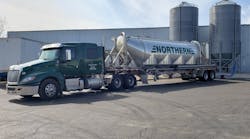The American Trucking Associations (ATA) remained supportive of the Federal Motor Carrier Safety Administration’s (FMCSA’s) mandate of electronic on-board recorders (EOBRs) for certain problem carriers. That mandate recently was struck down in federal court.
The US Court of Appeals for the Seventh Circuit issued an order to vacate the FMCSA’s final rule requiring motor carriers that are substantially non-compliant with the hours-of-service regulations to install EOBRs to monitor their compliance. The Owner-Operator Independent Driver Association (OOIDA) had the agency contending that the rule was arbitrary and capricious because it does not “ensure that the devices are not used to harass vehicle operators,” as required by law. The lawsuit also contended that the cost-benefit analysis failed to demonstrate the benefits of the technology and that the EOBRs violate the Fourth Amendment.
“Though we are still reviewing the Court’s decision, ATA supports FMCSA’s efforts to mandate the adoption and use of electronic logging devices for hours-of-service compliance,” ATA President and CEO Bill Graves said. “FMCSA’s research shows that compliance with the current hours-of-service rules is strongly associated with reduced crash risk. Of course, electronic logging devices are an important tool for improving hours of service compliance.
“We hope FMCSA will work quickly to address the Court’s decision and the important device design and performance specifications being evaluated by the Administrator’s Motor Carrier Safety Advisory Committee. As demonstrated by the record improvement in the industry’s safety record since the framework for the current hours-of-service rules went into effect and the agency’s own compliance and crash data, increasing compliance with the rules is vital. Of course, electronic logging devices are an important and effective means to this end.”








